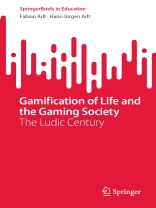This interesting book discusses why, as an activity, topic and metaphor, play and game have become an integral part of modern life. Empirically exemplary and theoretically grounded, this book discusses the developments and expansions in gaming, from easily accessible casual games to the galaxy-spanning gaming worlds of Massively Multiplayer Online Role-Playing Games (MMORPGs). It shows how gaming has become a focal point of the entertainment industry, marked by boundless professionalization and monetization, especially in the realm of sports, and how games become global platforms for social networks, where players from all over the world meet in digital sandboxes. The combination of the virtual and the ludic creates hyperreal spaces in which people try out new forms of interaction, cooperation, and even brainstorming. The authors ask if this behavior has become the new way of life and the new normal, and if this heralds the ludic century. They take readers on a journey to understand the dynamics of today’s gaming society, and base their observations and analyses on an original theory of play, which, in contrast to social normalcy, revolves around the allure and threats of the unexpected.
This book is of interest to students and researchers of social science and communication studies, especially those working on the interface of AI and society.
قائمة المحتويات
The game in real life, real life in the game. An Introduction.- The peculiarity of the game: Successful handling of the unexpected.- The computer as game, toy and player.- Instrumentalizations of the game.- Ludic culture of modern life: The Ludic.
عن المؤلف
Fabian Arlt M.A. studied media management and is doing his doctorate in social and business communication at the University of the Arts in Berlin.
Hans-Jürgen Arlt Prof. Dr. is a social scientist and publicist, he teaches at the Institute for Theory and Practice of Communication at the University of the Arts in Berlin.












